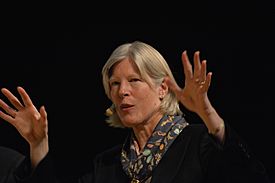Cynthia Kenyon facts for kids
Quick facts for kids
Cynthia Kenyon
|
|
|---|---|
 |
|
| Born | February 21, 1954 |
| Alma mater | Massachusetts Institute of Technology |
| Known for | Aging in C. elegans |
| Awards | Dan David Prize Dickson Prize |
| Scientific career | |
| Fields | Biologist |
| Institutions | Calico Life Sciences, LLC; Professor emeritus University of California San Francisco (UCSF) MRC Laboratory of Molecular Biology |
| Doctoral advisor | Graham C. Walker |
| Notable students | Coleen T. Murphy Andrew Dillin |
Cynthia Jane Kenyon (born February 21, 1954) is an American scientist. She studies the tiny parts of living things, like cells and DNA. She is famous for her work on how living things get older. She uses a small worm called C. elegans to understand the process of aging.
Cynthia Kenyon is currently a leader in aging research at Calico Research Labs. She is also a professor at the University of California, San Francisco (UCSF).
Contents
Cynthia Kenyon's Career
Cynthia Kenyon finished her studies at the University of Georgia in 1976. She was the top student in chemistry and biochemistry. In 1981, she earned her Ph.D. from MIT. There, she discovered how DNA-damaging things make certain genes active in bacteria called E. coli.
Early Research and Discoveries
After MIT, she worked with a famous scientist, Sydney Brenner, in England. She studied how C. elegans worms grow and develop. In 1986, she joined UCSF. She became a professor there, teaching about the tiny building blocks of life.
In 1999, she helped start a company called Elixir Pharmaceuticals. The goal was to find medicines that could slow down how people age.
Work at Calico
In 2014, Cynthia Kenyon became the Vice President of Aging Research at Calico. This new company focuses on health and living longer. She still works with UCSF as a professor.
Her early work showed that special genes called Hox genes control how the body parts of C. elegans worms are formed. These genes were already known to shape fruit flies. This discovery proved that Hox genes are very old and important for how many animals develop.
Understanding Aging in Worms
Scientists had found that changes in genes could affect how long C. elegans worms live. In 1993, Cynthia Kenyon made a big discovery. She found that changing just one gene, called Daf-2, could make the worms live twice as long! She also found that another gene, daf-16, could reverse this effect.
This discovery made many scientists start studying the biology of aging. Her findings showed that a hormone system, which is similar in many animals, affects aging. This might even include humans.
Awards and Honors
Cynthia Kenyon has received many important awards for her scientific work:
- 1997 Member, American Academy of Arts and Sciences
- 2000 King Faisal Prize for Medicine
- 2003 Member, United States National Academy of Sciences
- 2003 President, Genetics Society of America
- 2004 Association of American Medical Colleges Award for Distinguished Research
- 2005 Ilse & Helmut Wachter Award for Exceptional Scientific Achievement
- 2006 La Fondation IPSEN Prize in Longevity
- 2008 AARP Inspire Award
- 2011 Dan David Prize for the Future – Aging: Facing the Challenge
- 2021 Dickson Prize in Medicine
Personal Diet Choices
Cynthia Kenyon's research also changed her own eating habits. In 2000, she learned that giving sugar to worms made them live shorter lives. Because of this, she stopped eating foods that quickly turn into sugar in the body. She started eating a low-carbohydrate diet. She tried a diet where she ate very few calories for two days. However, she found it too hard because she was always hungry.
See also
 In Spanish: Cynthia Kenyon para niños
In Spanish: Cynthia Kenyon para niños
- Genetics of aging
 | Precious Adams |
 | Lauren Anderson |
 | Janet Collins |

